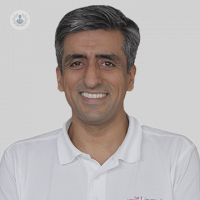What is interceptive orthodontics?
Written in association with:Around one-third of UK children and young people have teeth which would benefit from orthodontic treatment. The majority who need orthodontics will start treatment around the age of 11 or 12. This is the phase in early adolescence when the mouth and jaws are developing fast but most adult teeth have already come through. Orthodontics at this age harnesses the growth spurt and achieves dramatic change.
There are a minority of children who benefit from treatment at an earlier age, around seven years old. Based on where and how the teeth have grown and how the jaws have formed, an orthodontist can already assess whether there may be a dental issue in the future that can be avoided or minimised. To go down this route is known as interceptive orthodontics.
Orthodontist Dr Asif Chatoo tells us more about interceptive orthodontics and why it’s a good idea.

So, why is interception a good idea?
At an earlier age, it’s possible for an orthodontist to undertake treatment to avert a greater problem. A specialist can determine how the adult teeth will come through and what kind of smile and bite the future adult will have.
Interceptive treatment might sometimes involve extractions or the short-term use of appliances or space maintenance to help prevent more serious problems and avoid the need for complex orthodontic treatment at a later date. The interceptive approach includes treatments for all kinds of issues, including crowding, crossbites and overjets and underbites.
What dental damage does interceptive orthodontics help to avoid?
Around 8% of European children have a crossbite (around 56,000 children in England and Wales per year). Research shows that early correction can help avoid more complex treatment in the future, as a crossbite can cause a jaw displacement when biting, damaging the teeth and the gums. An orthodontic intervention can be achieved relatively easily which reduces the risk of this problem in the future.
Regarding protruding teeth (an increased overjet), the upper teeth appear too prominent. Early treatment can pull the teeth back behind the lips and reduce the risk of trauma to the teeth if the child trips and falls forwards onto their face.
An underbite - where the lower teeth bite in front of the upper teeth - treatment may help guide the teeth into a more favourable position to prevent damage to tooth enamel and gums.
Who needs interceptive orthodontics?
You can often tell who might be a candidate for treatment by looking at their parents. Do they have crowded teeth or did they have orthodontic treatment as a child?
However, sometimes, it’s impossible to tell, which is why it’s worth getting an early opinion for your child, especially if you have any concerns with the way their teeth are developing. An orthodontist will be able to identify, with the use of X-rays if there are missing teeth or extra teeth present which can affect the normal eruption of the teeth.
Early orthodontic assessment and interception can prevent impacted teeth in the right circumstances, although this is not entirely predictable in all cases. If impacted teeth are not diagnosed at an early age, months or even years of treatment will be required during the teenage years.
In summary, seven is a critical age in a child’s dental development and we recommend an orthodontic appointment just in case your child is among those who might benefit from early intervention. However, interceptive orthodontics does not cancel out future treatment which may well still be necessary at the usual age of 11 or 12.
Mr Chatoo and his team at The London Lingual Orthodontic Clinic happily welcome you and your child for an appointment. Whatever happens, they will be able to put your mind at rest, either because no treatment is warranted or because they are helping to avert a more complex treatment at a later age for your child.
To make an appointment, please visit Dr Chatoo’s Top Doctor’s profile.



